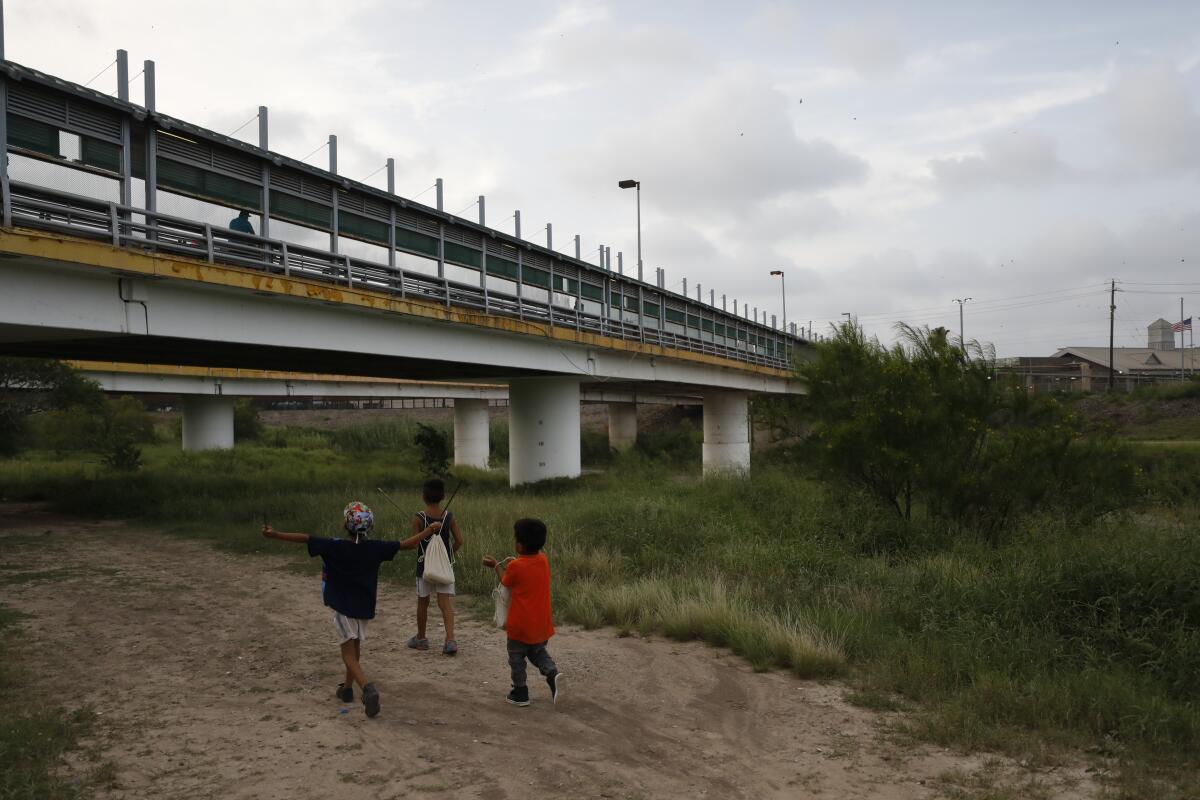More children face immigration judges through video screens

- Share via
ATLANTA — Seven children stood shoulder-to-shoulder in a Texas immigration facility. Their image was beamed nearly 1,000 miles away to Atlanta, where a judge sat in a largely empty courtroom and contended with glitchy audio.
At multiple points, a woman’s voice broke through the audio into the Atlanta courtroom, translating the testimony of an asylum seeker in a separate hearing.
The Trump administration this week expanded the use of video hearings for immigrant children, having dozens of kids held in Houston appear before a judge based in Atlanta. Advocates believe the effort could portend a nationwide expansion of video courts to process the immigration claims of children in U.S. government custody.
While the government would not confirm its plans, advocates warned of a greater burden being placed on detained immigrant children, many of whom are not yet teenagers and don’t have guaranteed access to an attorney.
Technical difficulties caused delays and snarled the launch of the hearings in Houston, one of the busiest immigration courts in the nation.
Video court hearings already occur in parts of Texas, Virginia, New York and Tennessee for some children held in facilities that are hours away from an immigration court.
But Houston has one of the nation’s largest immigration courts, with hundreds of cases heard weekly and children often appearing before a judge in person.
Neither the Executive Office for Immigration Review, or EOIR, which oversees immigration courts, nor the Office of Refugee Resettlement, or ORR, which has custody over 3,650 immigrant children, would explain why the Houston-to-Atlanta pilot was necessary. EOIR spokeswoman Kathryn Mattingly said use of video in general “reduces costs, increases hearing flexibility for backlogged dockets, and generally reduces processing or waiting times for decisions in administrative proceedings, without affecting the integrity of the proceedings.”
There were 25,351 immigration court hearings held by videoconference in the first 17 days of January, roughly a quarter of the 95,492 for all of 2019, according to government figures obtained by immigration attorney Andrew Free.
Most of the children in government custody crossed the U.S.-Mexico border alone. Some children in ORR’s custody were sent across the border by parents in border camps, while others may have been separated from a parent or adult relative due to suspected fraud or neglect.
On Monday, the first day of the change, Judge Sirce Owen in Atlanta saw dozens of children via videoconference. They included a confused 7-year-old boy with no lawyer, a teenage mother trying to calm her toddler daughter, and a group of kids all dressed in the same green sweaters.
In the Atlanta courtroom, against the din of fuzzy audio, the judge pressed on with the group of seven children from a government-run facility in Corpus Christi, Texas, telling them why they were there and explaining their rights.
As the audio interference worsened, Owen narrowed her eyes at the screen and said, “We’re hearing some feedback on the microphone.”
The audio problems continued as the judge finished with the kids, resetting their hearings for April 20 to give them time to find attorneys.
As Owen waited for another group of children to file into the room in Corpus Christi, a female interpreter’s voice came over the speakers in the courtroom, “...and they pointed a gun at me...,” before fading to garble.
Outside observers are typically prevented from sitting in on asylum testimony to protect the privacy of the people applying. Owen ultimately cut off the video and delayed court for more than an hour so the problem could be fixed.
Judges have been urged to decide children’s cases more quickly, and attorneys learned that government-contracted facilities would no longer take children to law offices for meetings, making these cases more difficult to prepare, said Jennifer Podkul of immigrant advocacy group Kids in Need of Defense.
More to Read
Sign up for Essential California
The most important California stories and recommendations in your inbox every morning.
You may occasionally receive promotional content from the Los Angeles Times.










